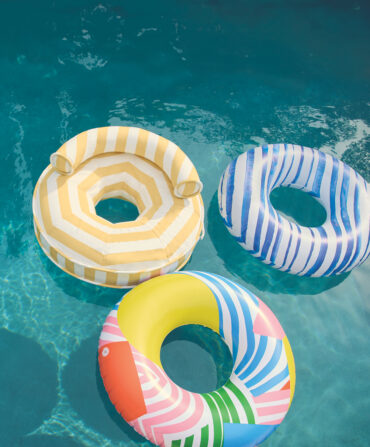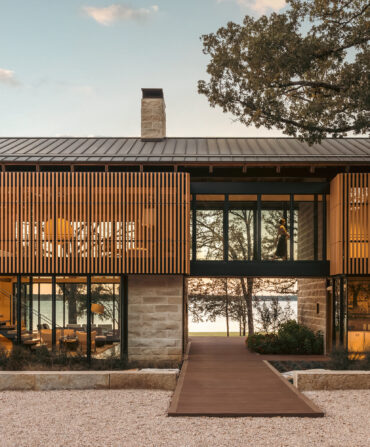Hurricane Ian
A Safe Harbor for Animals in the Path of Ian
Besides horses, the World Equestrian Center in Central Florida welcomed a medley of species—including a kangaroo—to hunker down during Hurricane Ian.
Plus: More stories of animals weathering the storm
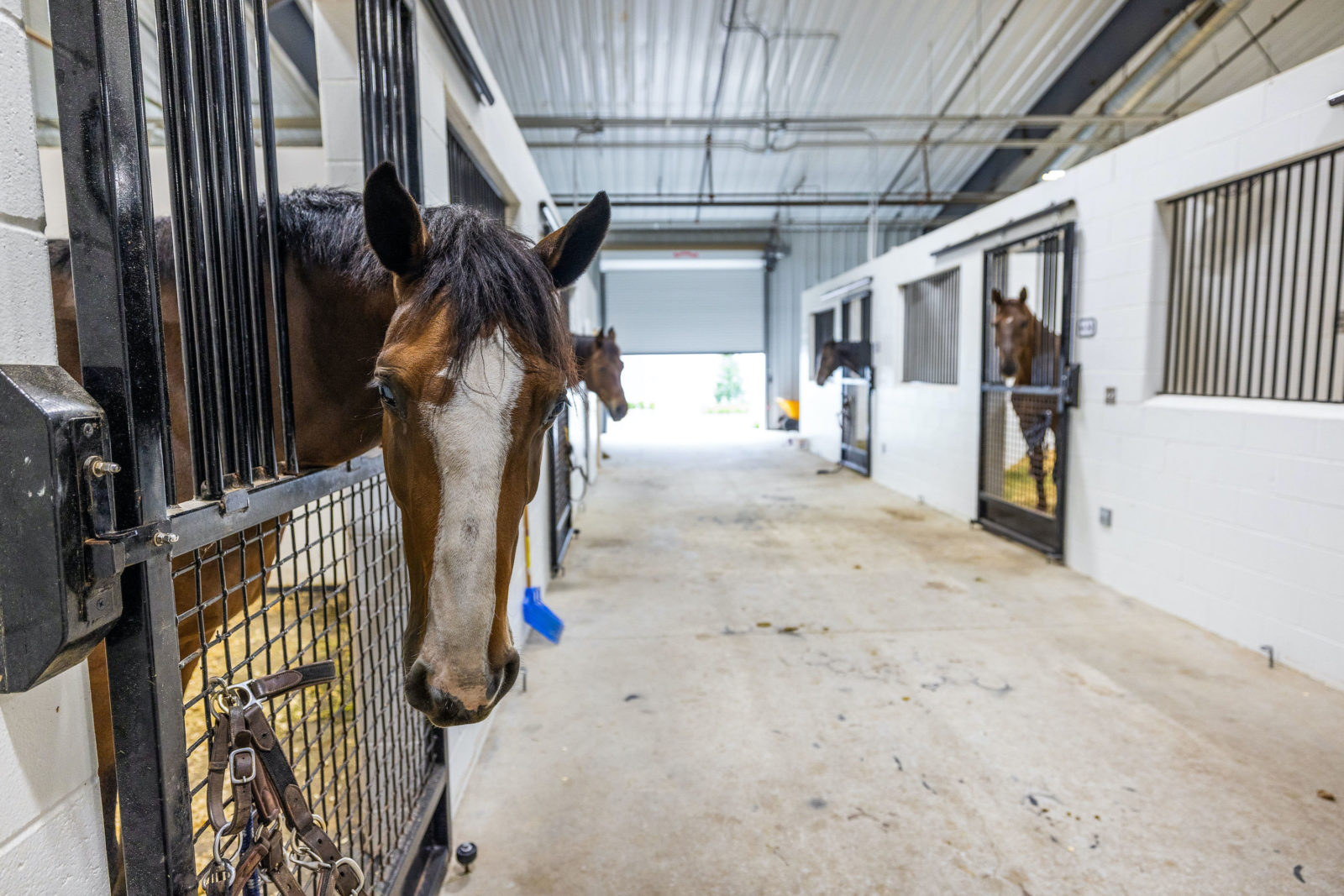
Photo: Maven Photo + Film
Horses sheltering at WEC.
If you strolled through the barns of the World Equestrian Center in Ocala, Florida, this week, you might have been surprised to see a few unusual faces peeping through the stall doors. A kangaroo, goats, a sheep, a tortoise, and several dozen miniature horses to name a few.
As Floridians faced devastating conditions in the path of Hurricane Ian, WEC opened its doors and offered animal owners a refuge. The facility is the largest equestrian complex in the United States, with 378 acres (plus 300 more acres for future expansion) of stables, arenas, and a world-class hotel. It hosts frequent events, but since no shows were scheduled for this week, thousands of stalls across twenty-five barns were available for evacuees.
“We had a game plan and had ordered in plenty of food and supplies,” says Justin Garner, the center’s director of hotel and hospitality operations. “We knew that even if we had a catastrophic event, we had the infrastructure in place to support the community. We were ready for the worst.”

Photo: Maven Photo + Film
One of the miniature horses from the Peeps Foundation.
WEC began spreading the word last week for owners to bring their horses to its climate-controlled concrete barns, nestled in the gently rolling hills of Florida about forty miles north of Orlando. More than 3,000 equines arrived, from seasoned show horses and family pets to mini donkeys and even young foals. To ease the burden of an already stressful situation, WEC offered up the stalls for free. Some owners stayed on-site at the hotel or at nearby home rentals, though many camped in stalls near their animals.
Josh Dolan, owner of the Peeps Foundation miniature horse rescue, made the move early this week with his menagerie of forty minis, ten show horses, a tortoise, a goat, and of course, Spanky the kangaroo, who’s become a bit of a celebrity. “We literally live about ten feet from WEC, so we didn’t have to travel far and everyone settled in really well,” Dolan says. “Our guys have all the visitors they could ever want. Staying here has allowed us to spend extra pampering time with the animals as well—it’s basically been like three days at a spa for them.”
Photo: Maven Photo + Film
Spanky the kangaroo, along with several miniature horses, relaxes in the comfortable accommodations at the World Equestrian Center.
1 of 4
Photo: Maven Photo + Film
Josh Dolan, founder of the Peeps Foundation, with a few of its residents.
2 of 4
Photo: Maven Photo + Film
A television broadcasts the latest hurricane news, while evacuees enjoy a meal provided by WEC.
3 of 4
Photo: Laura Wood
Laura Wood’s young foal, Deep Blue, and its mother peer out from their stall.
4 of 4
Other equestrians who often show their horses at the facility took advantage of the opportunity. “I am extremely grateful to have WEC so close to home that we can shelter in if needed,” says Kayla Benney, a newly minted local who helped transport and care for forty horses (six of whom are her own). “Our horses are show horses, so they settled in fairly quickly, though they’re a bit disappointed that they aren’t showing and a little confused why we aren’t tacking them up and taking them to the ring.”
Other owners traveled from the Gulf Coast to escape the storm’s path. “One of my daughters and I hauled to WEC on Tuesday and have been camping in a stall since then,” says Casey Giardino, who brought seven of her family’s horses from their Brooksville, Florida, farm about ten miles from the coast. “I can’t imagine what it’s costing WEC to host us free of charge, and I’m so thankful they opened their doors to us.”
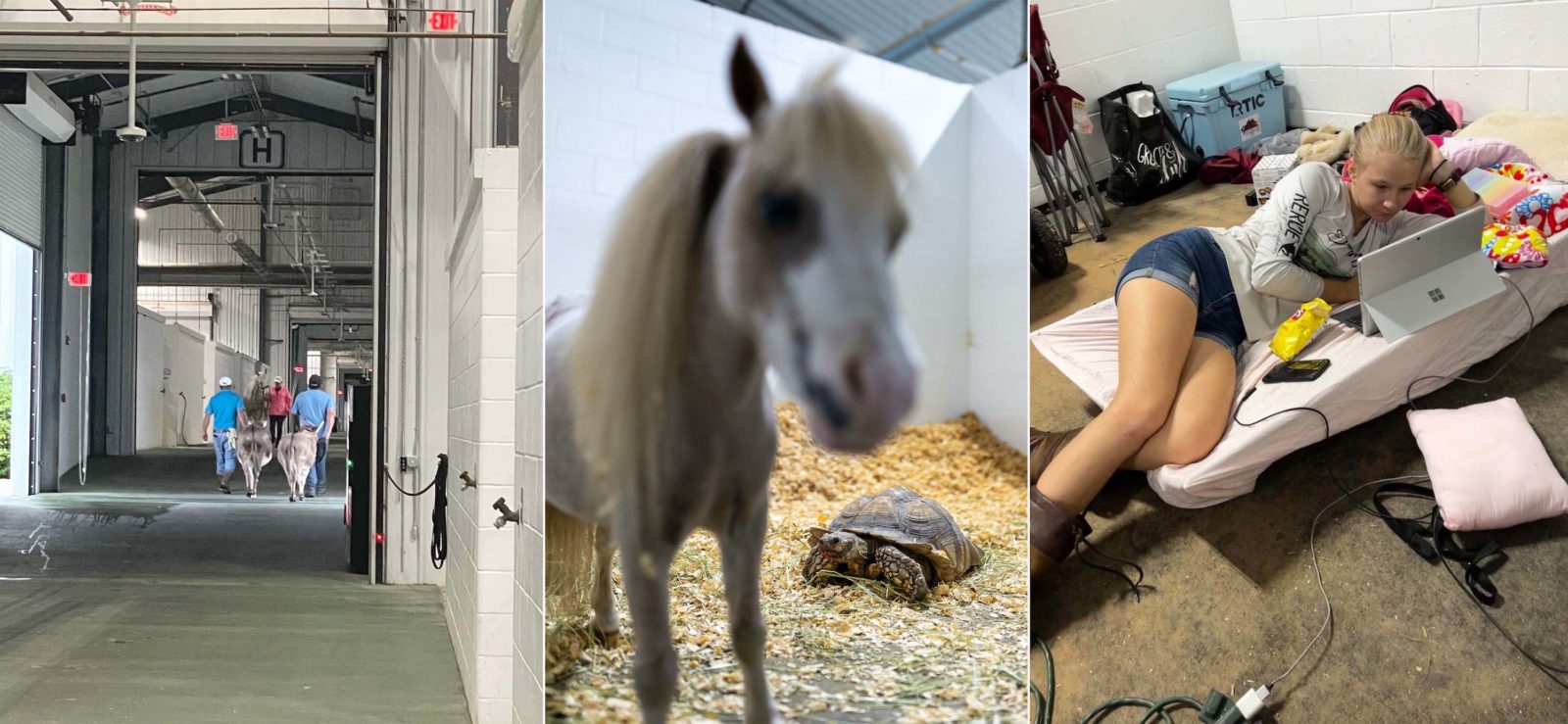
Photo: Kayla Benney; Maven Photo + Film; Casey Slayton
From left: A pair of donkeys stroll down a spacious barn aisle; Turbo the Tortoise sheltering in a stall, alongside his mini friends; Hailey Slayton, fourteen, takes a moment to relax in between caring for her family’s seven horses with her mother, Casey.
One owner had her hands full at WEC, taking care of five young foals and their dams, four stallions, three show horses, and a pregnant mare that she’d transported from her Gulf Coast farm. “I was so worried about my foals surviving this storm,” says Laura Wood, also of Brooksville. “WEC was absolutely vital in saving them.”
Keeping the animals safe was a top priority for the WEC crew, but so was helping their owners stay comfortable and well fed. For just a few bucks, evacuees received three meals a day, and the center set up a big-screen broadcast of hurricane news. “This helped me make the decision to stay put tonight,” Wood says.
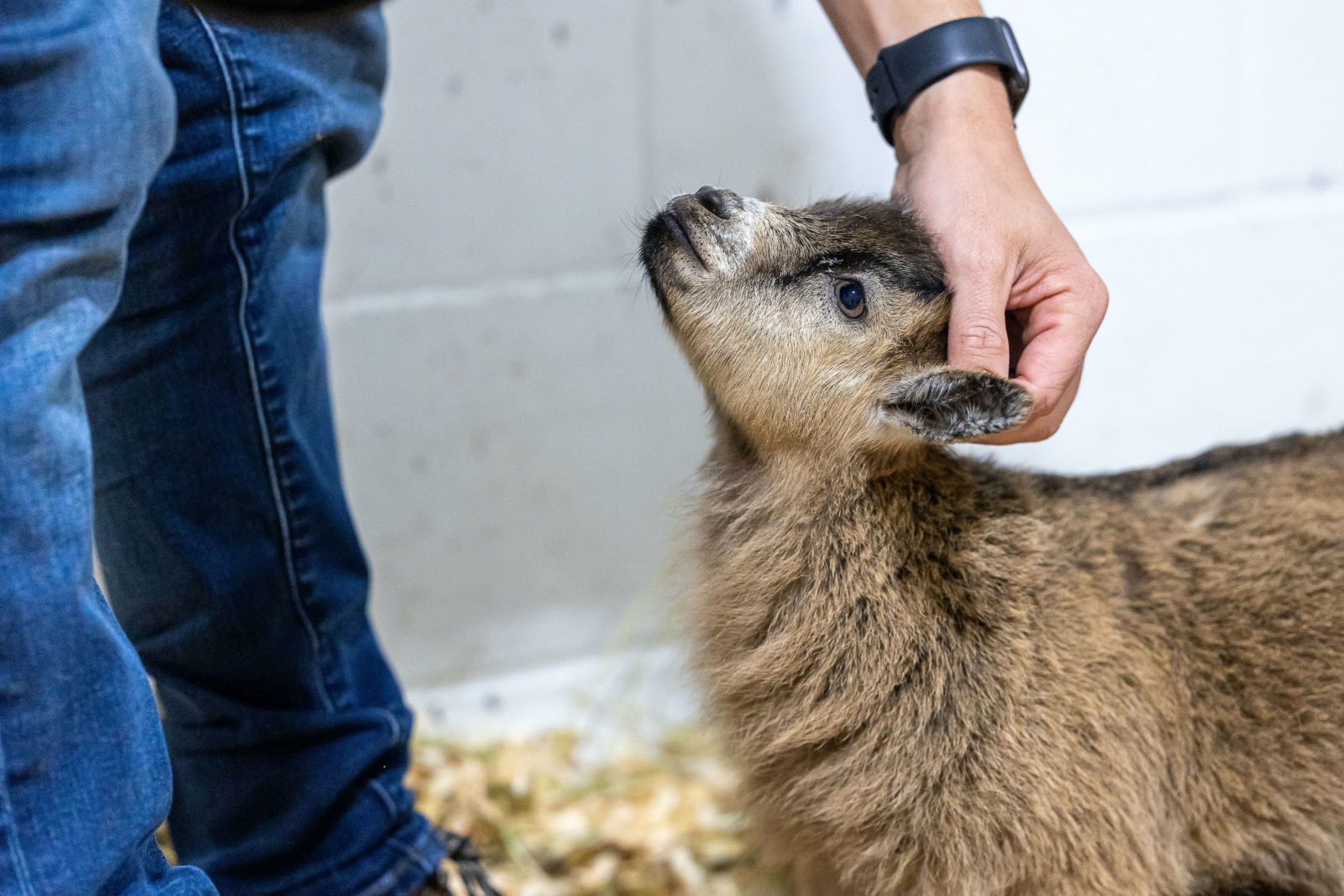
Photo: Maven Photo + Film
A goat from the Peeps Foundation.
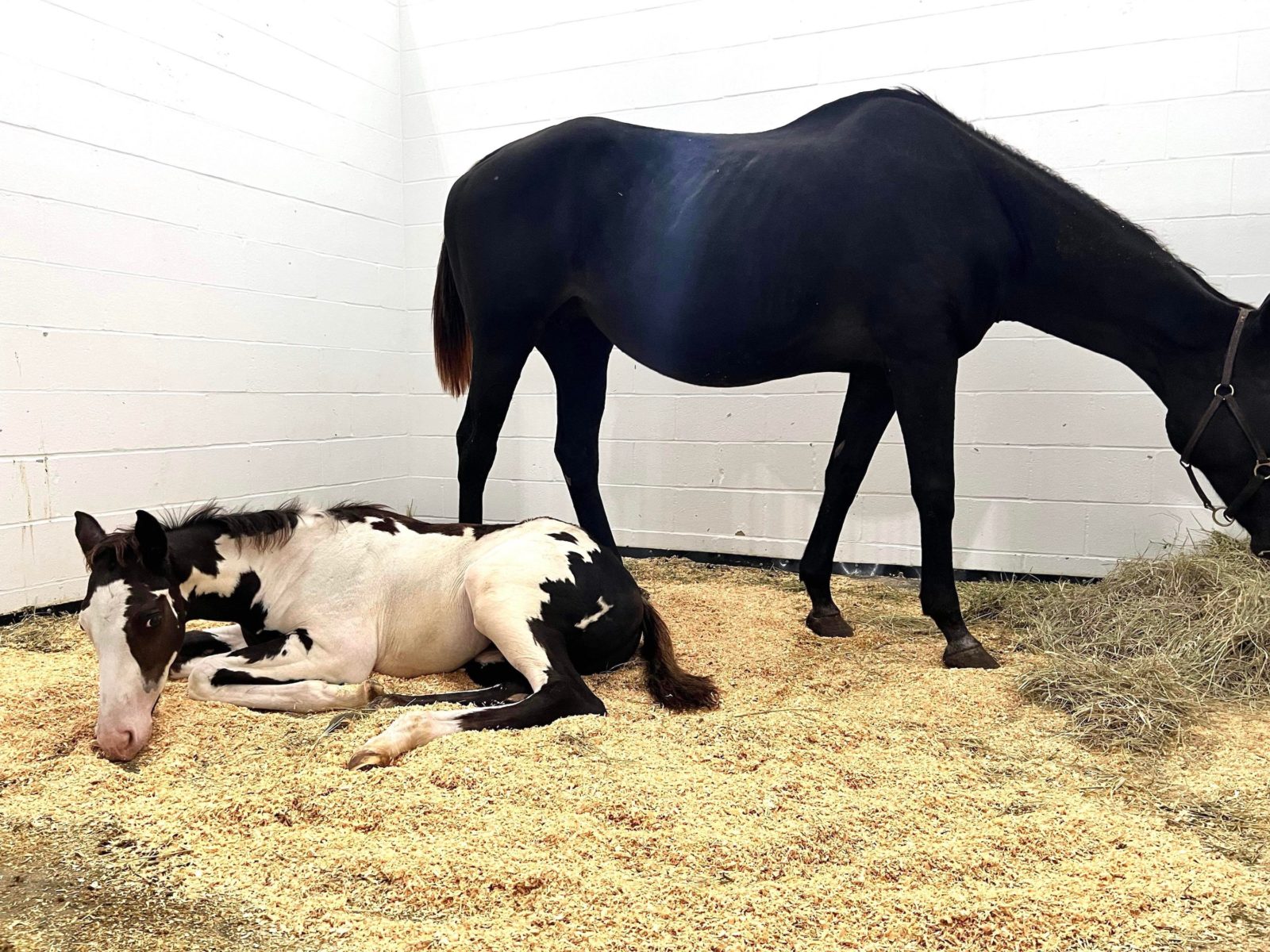
Photo: Laura Wood
A foal rests alongside its mother.
WEC, which also has a venue in Wilmington, Ohio, is the vision of the Roberts family: Larry, his wife, Mary, and their son, Roby. The Roberts, who own the shipping company R+L Carriers, are passionate about animals, and horses in particular. “It’s a little bit like Noah’s Ark here,” Garner says.
In addition to helping out the equestrian community, the facility is also housing more than three hundred first responders and lineworkers from the power company Duke Energy.
MORE ON ANIMALS AND IAN
Not-So-Ruffled Feathers
The famed free-range chickens of Tampa’s Ybor City are doing well, according to Dylan Breese, president of the Ybor Chicken Society, which operates a sanctuary for sick and injured members of the feral flock. With help from the sanctuary’s neighbor, the J.C. Newman Cigar Company, Breese and his team sheltered forty to fifty chickens and kept a close eye on the birds left to weather a difficult night, though the city did not take a direct hit from the hurricane.
“We brought in a bunch from the streets—moms with babies and any that have vulnerabilities,” Breese says. “There were a bunch that had to weather the storm. Last night, once it calmed down around 2 a.m., I went out to see if any were in distress. They were all in their normal spots up in the trees. We went back out this morning just in case we missed anything, and they all looked like it was a normal day for them.”
Shelters for the Storm
Before a major weather event, animal shelters in the crosshairs get anxious to free up space—not just to protect their wards but to make room for an influx of displaced animals. So it was that forty-two unhomed cats from Tampa and Fort Myers arrived at Massachusetts’s Worcester Regional Airport Wednesday at noon. After a two-day quarantine at facilities operated by the Massachusetts Society for the Prevention of Cruelty to Animals, they will be available to adopt at mspca.org/adopt. “We expect they’ll go like hotcakes because what a story they have,” says Rob Halpin, MSPCA communications director. The Greater Birmingham Humane Society also traveled to Florida to rescue more than forty dogs from the Tampa area.
Wayward Wildlife: What to Do
Tweets and news reports have shown sharks and alligators swimming through residential floodwaters, but Floridians can expect to see many types of critters turn up in unusual places in the coming weeks, including bears searching for food, stranded manatees, owls driven from burrows, and no shortage of snakes, according to the Florida Fish and Wildlife Conservation Commission. In case of an encounter, keep your distance and call designated wildlife rescue hotlines; a list by animal is available here.
Vivian Hodges and Elizabeth Florio contributed to this report.






